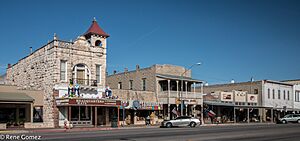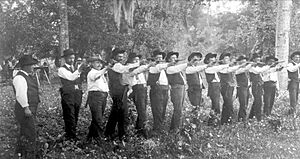Texas Germans facts for kids

The flag of Texas.
|
|
| Regions with significant populations | |
|---|---|
| Texas | |
| Languages | |
| Texas German, Texas English | |
| Religion | |
| Christianity | |
| Related ethnic groups | |
| Missouri Rhinelanders, Louisiana Creoles, Tejanos, Pennsylvania Dutch, German Americans |
Texas Germans are people whose families came from Germany and settled in Texas starting in the 1830s. Many of these German settlers chose to live close to each other in special communities. Most of them settled in a wide area across the south-central part of Texas. Here, many became farmers. By 1990, about three million Texans said they had German family roots.
Contents
The Story of Texas Germans

A lot of Germans started moving to Texas during the time it was an independent country, from 1836 to 1846. This happened after a group in Germany created the Adelsverein in 1842. This group was formed to help protect German people who wanted to move to Texas.
The Adelsverein helped set up German communities all over Texas. They even bought a huge piece of land, about 5,000 square miles, between the Colorado and Llano Rivers. In 1847, a man named John O. Meusebach worked for the Adelsverein. He made a special agreement called the Meusebach–Comanche Treaty with the Comanche people. This treaty allowed German settlers to live on the land. It is still known as the only treaty between European-American settlers and Native Americans that was never broken.
New Beginnings in Texas
After Texas became a state, many new settlers arrived. A big group were the "Forty-Eighters". These were people who left Germany after some big political changes in 1848. They spread out into different parts of Central Texas. Over many years, the German Texans spoke a special version of the German language. It became known as Texas German (Texasdeutsch). This language was connected to the time when most Germans moved to Texas.
In Germany, the language changed over time. But among the German communities in Texas, it stayed more isolated. Because of this, Texas German became a unique dialect. However, after World War I and World War II, this special language mostly disappeared. Many other German dialects spoken in the United States also faded away.
German Texans and Their Communities
In the 1850s, Texas Germans were strong supporters of ending slavery. During the American Civil War, they did not agree with certain rules and military drafts. Some of them faced challenges, like those at the Nueces massacre. After the war, during a time called Reconstruction, Texas Germans lived quietly. They worked as teachers, doctors, and farmers. They also became civil servants, politicians, musicians, and ranchers.
They founded many towns in the Texas Hill Country, like Bulverde, New Braunfels, Fredericksburg, Boerne, and Comfort. They also started towns like Schulenburg, Walburg, and Weimar to the east.
Today, there are several places that celebrate German-American culture in Texas. These include the Sophienburg Museum in New Braunfels and the Pioneer Museum in Fredericksburg. There's also the Witte-Schmid Haus Museum in Austin County. Groups like the German-Texan Heritage Society and the Texas German Society also help keep the culture alive.
Black Texas Germans
In the 1800s, Texas Germans and Black people often worked and spent time together. Black Texans found it easier to interact with Texas Germans than with white Anglo-Texans. Black communities, often called "Freedom colonies," had economic ties with Texas German communities. They also had friendly relationships.
After the Civil War, there were reports of Black Texas German communities in every county of the "German belt." This area stretches from Houston to the Hill Country. For Black Texans, speaking Texas German was sometimes a way to fit in and find protection.
Doris Williams, an African American from Bastrop County, shared a memory:
"We lived near Smithville Texas with my grandparents, and they always referred to people as Dutch... the thing that fascinated me most about them was that they never said anything negative about German people... you know, they would say 'Oh, he's German, you know that German family.' But they never said anything bad about them, and I felt that was unique, because they did say bad things about other people, but not about the Germans."
Black Texans and Texas Germans had a strong political connection. They often supported the same political groups. This connection became very important, especially in the 1920s. At that time, some groups tried to cause problems for Texas Germans. They wanted to get rid of the Texas German culture in Texas. The friendship between Black and German communities helped both groups protect each other.


